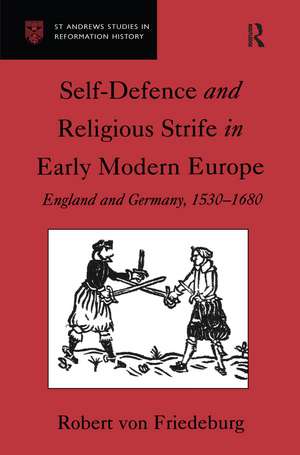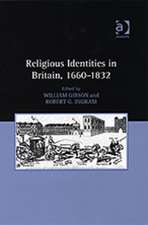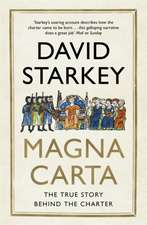Self-Defence and Religious Strife in Early Modern Europe: England and Germany, 1530–1680: St Andrews Studies in Reformation History
Autor Robert von Friedeburgen Limba Engleză Hardback – 21 aug 2002
Din seria St Andrews Studies in Reformation History
- 15%
 Preț: 695.67 lei
Preț: 695.67 lei -
 Preț: 311.51 lei
Preț: 311.51 lei -
 Preț: 313.38 lei
Preț: 313.38 lei - 23%
 Preț: 942.80 lei
Preț: 942.80 lei - 25%
 Preț: 772.07 lei
Preț: 772.07 lei - 18%
 Preț: 1054.71 lei
Preț: 1054.71 lei - 18%
 Preț: 1000.27 lei
Preț: 1000.27 lei - 28%
 Preț: 880.05 lei
Preț: 880.05 lei - 30%
 Preț: 768.30 lei
Preț: 768.30 lei - 15%
 Preț: 240.92 lei
Preț: 240.92 lei - 26%
 Preț: 822.34 lei
Preț: 822.34 lei - 18%
 Preț: 1000.27 lei
Preț: 1000.27 lei - 26%
 Preț: 765.43 lei
Preț: 765.43 lei - 25%
 Preț: 766.66 lei
Preț: 766.66 lei - 18%
 Preț: 1000.27 lei
Preț: 1000.27 lei - 25%
 Preț: 498.88 lei
Preț: 498.88 lei - 18%
 Preț: 1053.16 lei
Preț: 1053.16 lei - 25%
 Preț: 767.88 lei
Preț: 767.88 lei - 18%
 Preț: 1054.71 lei
Preț: 1054.71 lei - 26%
 Preț: 764.87 lei
Preț: 764.87 lei - 18%
 Preț: 1062.62 lei
Preț: 1062.62 lei - 18%
 Preț: 1005.01 lei
Preț: 1005.01 lei - 25%
 Preț: 768.82 lei
Preț: 768.82 lei - 26%
 Preț: 765.19 lei
Preț: 765.19 lei - 18%
 Preț: 1062.98 lei
Preț: 1062.98 lei - 31%
 Preț: 764.20 lei
Preț: 764.20 lei - 30%
 Preț: 769.55 lei
Preț: 769.55 lei - 25%
 Preț: 768.30 lei
Preț: 768.30 lei - 25%
 Preț: 770.31 lei
Preț: 770.31 lei -
 Preț: 349.80 lei
Preț: 349.80 lei - 26%
 Preț: 765.84 lei
Preț: 765.84 lei - 26%
 Preț: 765.84 lei
Preț: 765.84 lei - 18%
 Preț: 1004.20 lei
Preț: 1004.20 lei - 25%
 Preț: 496.94 lei
Preț: 496.94 lei - 18%
 Preț: 1001.84 lei
Preț: 1001.84 lei - 25%
 Preț: 770.62 lei
Preț: 770.62 lei - 25%
 Preț: 739.65 lei
Preț: 739.65 lei - 25%
 Preț: 772.76 lei
Preț: 772.76 lei - 25%
 Preț: 767.47 lei
Preț: 767.47 lei - 18%
 Preț: 1063.89 lei
Preț: 1063.89 lei - 18%
 Preț: 1057.09 lei
Preț: 1057.09 lei - 26%
 Preț: 765.01 lei
Preț: 765.01 lei - 31%
 Preț: 764.20 lei
Preț: 764.20 lei - 18%
 Preț: 1005.04 lei
Preț: 1005.04 lei - 25%
 Preț: 768.46 lei
Preț: 768.46 lei - 31%
 Preț: 763.39 lei
Preț: 763.39 lei -
 Preț: 376.48 lei
Preț: 376.48 lei
Preț: 288.80 lei
Nou
Puncte Express: 433
Preț estimativ în valută:
55.26€ • 57.96$ • 46.00£
55.26€ • 57.96$ • 46.00£
Carte disponibilă
Livrare economică 11-25 martie
Livrare express 25 februarie-01 martie pentru 32.66 lei
Preluare comenzi: 021 569.72.76
Specificații
ISBN-13: 9780754601777
ISBN-10: 0754601773
Pagini: 290
Ilustrații: index
Dimensiuni: 156 x 234 x 19 mm
Greutate: 0.45 kg
Ediția:New ed
Editura: Taylor & Francis
Colecția Routledge
Seria St Andrews Studies in Reformation History
Locul publicării:Oxford, United Kingdom
ISBN-10: 0754601773
Pagini: 290
Ilustrații: index
Dimensiuni: 156 x 234 x 19 mm
Greutate: 0.45 kg
Ediția:New ed
Editura: Taylor & Francis
Colecția Routledge
Seria St Andrews Studies in Reformation History
Locul publicării:Oxford, United Kingdom
Cuprins
Contents: Preface; Introduction: Sovereignty and religious strife: the state of the argument on resistance and self-defence; The Rule of Law Vindicated: Reform and reformation: resistance and defence in German lands 1488-1528; Self-defence and social status: the model developed - Torgau to Magdeburg 1529-1550; The delicate balance: the rule of law and religious strife in the Empire 1555-1620; Patriots and peasants: self-defence and the horrors of war, 1618-1648; The Rule of Law Disintegrated: Necessity, Self-Defence and the Reception of German Political Thought in England 1553-1648: The Marian and Elizabethan reception of German thought on resistance; Monarchy, obedience and German precedents 1588-1630s; Religious strife and self-defence 1638-48; Conclusion: self-defence, religious strife and political thought; Bibliography; Index.
Recenzii
'... provides both rich and contextualised accounts...Professor von Friedeburg has written a rich and stimulating book, and one that should play a distinguished role in further increasing our awareness of the European contexts of English political thinking...a most useful introduction to the political thought of early modern Germany...an important and valuable book.' Glenn Burgess, University of Hull 'Self-Defence and Religious Strife is a first-rate contribution to the task of understanding early modern England in European context... provides both rich and contextualised accounts... Professor von Friedeburg has written a rich and stimulating book, and one that should play a distinguished role in further increasing our awareness of the European contexts of English political thinking... This is an important and valuable book.' Albion '... it shows from an impressive number of sources that Germany's and England's political traditions were interwoven in decisive respects...' History of Political Thought '... a well-written, thoughtful and convincing study offering important insights for readers interested in early modern political theory.' Journal of Early Modern History
Descriere
This book explores the emergence of the nationally diverging paths taken by England and Germany in relation to the legal concept of self-defence. It explores how various theories of legitimate resistance to authority were developed and how they came to influence one another. In particular it is argued that German theories played a much greater role than has hitherto been acknowledged in influencing English concepts of 'natural rights' as discussed by such men as Parker and Locke.









